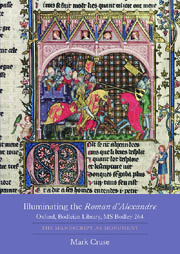 Illuminating the 'Roman d'Alexandre': Oxford, Bodleian Library, MS Bodley 264
Illuminating the 'Roman d'Alexandre': Oxford, Bodleian Library, MS Bodley 264 Book contents
- Frontmatter
- Contents
- List of Illustrations
- Acknowledgements
- Abbreviations
- Introduction
- 1 A Monument to Cortoisie
- 2 Urban Conquest and Spectacle
- 3 “Apraigne d'Alixandre”: Illuminating Exemplarity in Bodley 264
- 4 Alexander, Crusade, and the East in Bodley 264
- 5 The Production, Patronage, and Later Reception of Bodley 264
- Conclusion: Alexander in the Late Middle Ages
- Afterword: Mirror In Pixels
- Bibliography
- Index
- Already Published
Afterword: Mirror In Pixels
Published online by Cambridge University Press: 05 February 2013
- Frontmatter
- Contents
- List of Illustrations
- Acknowledgements
- Abbreviations
- Introduction
- 1 A Monument to Cortoisie
- 2 Urban Conquest and Spectacle
- 3 “Apraigne d'Alixandre”: Illuminating Exemplarity in Bodley 264
- 4 Alexander, Crusade, and the East in Bodley 264
- 5 The Production, Patronage, and Later Reception of Bodley 264
- Conclusion: Alexander in the Late Middle Ages
- Afterword: Mirror In Pixels
- Bibliography
- Index
- Already Published
Summary
Having examined what Bodley 264 meant in its medieval context, we turn now to what it means today and, equally important, to how its meanings can be expressed. Like all great monuments, Bodley 264 is a provocative mystery — it possesses an aura of significance, but its messages must be excavated and articulated in new languages for new audiences. The book you are reading is but one response to Bodley 264 — and, in its form and approach, a very traditional one at that. There are a myriad of other ways in which to think and talk about this manuscript. Bodley 264 encourages us to examine questions at the heart of the practice of medievalism as a method of both research and of teaching : What are medieval documents, and who can have access to them? How do we talk to students and to the public about them? How can we make manuscripts, and therefore our discipline, relevant outside the academy, archives, and museums?
Bodley 264 is a remarkably useful artifact for explaining the nature of medieval documents for the reasons discussed in this study. With its numerous exceptional features — large folios, Alexander compilation, full-page miniatures, marginalia, musical insertion — Bodley 264 is an exaggerated reminder that all medieval documents, even the most humble, are unica produced in a pre-industrial age. These features also reveal that this manuscript was designed to give the reader/viewer a sense of privileged access, not only to the narrative it preserved but to the bookspace itself.
- Type
- Chapter
- Information
- Illuminating the 'Roman d'Alexandre': Oxford, Bodleian Library, MS Bodley 264The Manuscript as Monument, pp. 205 - 208Publisher: Boydell & BrewerPrint publication year: 2011


